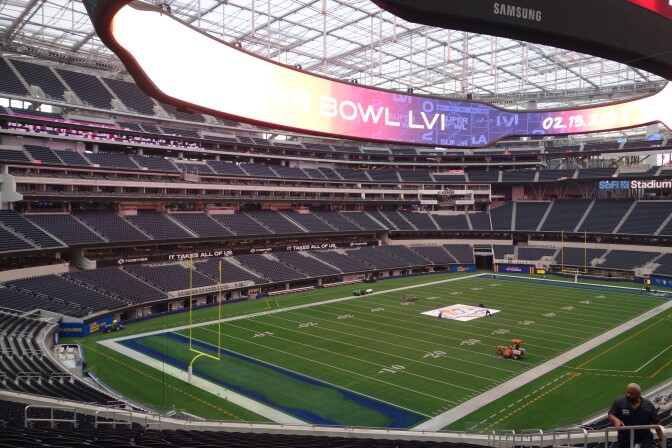This story is free to read because readers choose to support LAist. If you find value in independent local reporting, make a donation to power our newsroom today.
LA's First Super Bowl In Almost 30 Years Is Here — Why It’s Back After So Long And What It Was Like Last Time

In February 1993, the last time the Super Bowl was held in Southern California, Bill Clinton had just been sworn in as president, Whitney Houston sat atop the Billboard Hot 100 chart with “I Will Always Love You,” and the idea of a smartphone was barely fathomable.
That year, the Dallas Cowboys steamrolled the Buffalo Bills 52-17 at the Rose Bowl. O.J. Simpson tossed the coin at the start of the game and Michael Jackson put on a halftime show that remains one of the most-watched events in television history.

Initially, the 1993 Super Bowl wasn't even supposed to be in L.A. The game had originally been awarded to Phoenix, but after voters in Arizona failed to approve Martin Luther King Jr. Day as a paid holiday, National Football League owners voted to move the Super Bowl to another city.
When the NFL started considering alternative venues, Southern California seemed like an obvious choice — the Rose Bowl and the City of Pasadena were no stranger to major events, hosting the Rose Parade and Rose Bowl game every year, and the league thought it would be easy to plug-and-play the game in a place that had venues and infrastructure at the ready.
Twenty-nine years later, the Super Bowl is back in Southern California. But, why did it take so long for the NFL to bring its biggest game back to America’s second-most populous city?
No Team? No Game. But There's More To The Story
The short answer is that the Rams and Raiders left Los Angeles in 1994, and the league only awards Super Bowls to cities with NFL teams. But there was more to it than just that, said longtime L.A. sports executive Alan Rothenberg.
"There was an ongoing antipathy to the L.A. Coliseum Commission, which ran the Coliseum, against bringing an NFL team to Los Angeles," said Rothenberg, who in 1993 was a member of the Los Angeles Sports Council, which worked on the Super Bowl bid. "Partly because of the unhappy relationships that had been involved with the Coliseum Commission and the Raiders and Rams, and partly because the NFL embarked on a pretty extensive program of requiring cities to come up with financial packages in order to help NFL owners build stadiums."
Rothenberg says with the construction of SoFi Stadium along with the Rams' return to Los Angeles after 22 years in St. Louis, the NFL saw an opportunity to put its biggest game in a brand new stadium in a world-renowned city and jumped at it, awarding the Super Bowl to Southern California in May 2016.
The Future Home Of The Super Bowl ... And More

SoFi Stadium may be taking the world stage during Super Bowl LVI for the first time, but it won't be the last, said, Kathryn Schloessman, CEO of the Los Angeles Super Bowl Host Committee and president and CEO of the Los Angeles Sports and Entertainment Commission.
"We are planning to host a Super Bowl every four or five years," Schloessman said. She and her team worked on the bid to secure Super Bowl LVI, and she said it's been their full-time focus since early 2020.
"It’s a little surreal that it’s finally all coming together — all the Zoom calls, all the meetings, all the preparations, the plans, the discussions — you’re actually seeing it come to life, and that’s pretty neat."
She said the excitement level was high already for the Super Bowl, but when the Rams advanced to the game after beating the San Francisco 49ers in the NFC Championship game it added a new dimension.
"That’s taken it to a whole new level of excitement and interest and all the parties and activities that are happening," she said. "I’ve never seen anything like this in my life."

And it won't be just Super Bowls coming to SoFi in the coming years — in 2023, the stadium will host the College Football Playoff National Championship and World Wrestling Entertainment's biggest annual event, Wrestlemania. Los Angeles is also in the process of bidding to be a host site for the 2026 FIFA World Cup, which would mean SoFi is an option for a venue, and in 2028 the Olympics return to SoCal and SoFi will be a likely event space. But for now, the focus is on making sure this year goes smoothly so the NFL will come back to L.A. for future Super Bowls.
"I think we can count on [the NFL] coming back here frequently," says Alan Rothenberg. "If we had to have any better showcase, it’d be this coming weekend when the weather’s going to be in the 80s and it's snowing everywhere else back east!"








